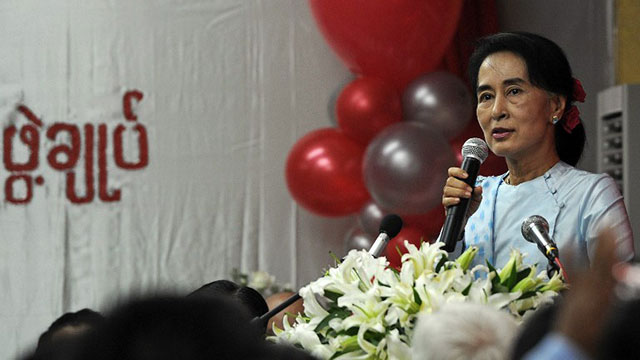SUMMARY
This is AI generated summarization, which may have errors. For context, always refer to the full article.

YANGON, Myanmar – Myanmar pro-democracy leader Aung San Suu Kyi’s opposition party vowed Saturday, December 28, to contest crucial elections in 2015 even if the constitution is not amended first to allow her to become president.
The military-drafted charter blocks anyone whose spouse or children are overseas citizens from leading the country – a clause widely believed to be targeted at the Nobel laureate whose two sons are British.
The constitution also ring-fences a quarter of the seats in parliament for unelected military personnel.
Suu Kyi has repeatedly warned that the charter must be changed to allow democracy to take root in the former junta-ruled country, and there had been speculation her party might even boycott the 2015 parliamentary polls.
But a spokesman for her National League for Democracy (NLD) said after a party meeting Saturday that the opposition would take part even without a constitutional amendment.
“We must compete in the 2015 election whatever,” he told reporters, adding that the NLD was aiming for an even bigger victory than in landmark by-elections in 2012 that saw Suu Kyi and her party enter parliament.
In Myanmar parliament chooses the president.
The fledgling legislature is dominated by the military and its political allies so an election victory would make it easier for the NLD to push for a constitutional amendment.
The NLD was founded in 1988 after a popular uprising against the military junta that left thousands dead.
Two years later, the party won elections in a landslide – but the results were never recognized by the regime.
Suu Kyi was under house arrest at the time and spent much of the following two decades in detention, until she was freed after controversial elections in 2010 that her party boycotted.
President Thein Sein’s reformist government has since overseen dramatic political and economic reforms, leading to the lifting of most Western sanctions.
A parliamentary panel is now reviewing the constitution and is expected to report its recommendations at the end of January. – Rappler.com
Add a comment
How does this make you feel?





There are no comments yet. Add your comment to start the conversation.